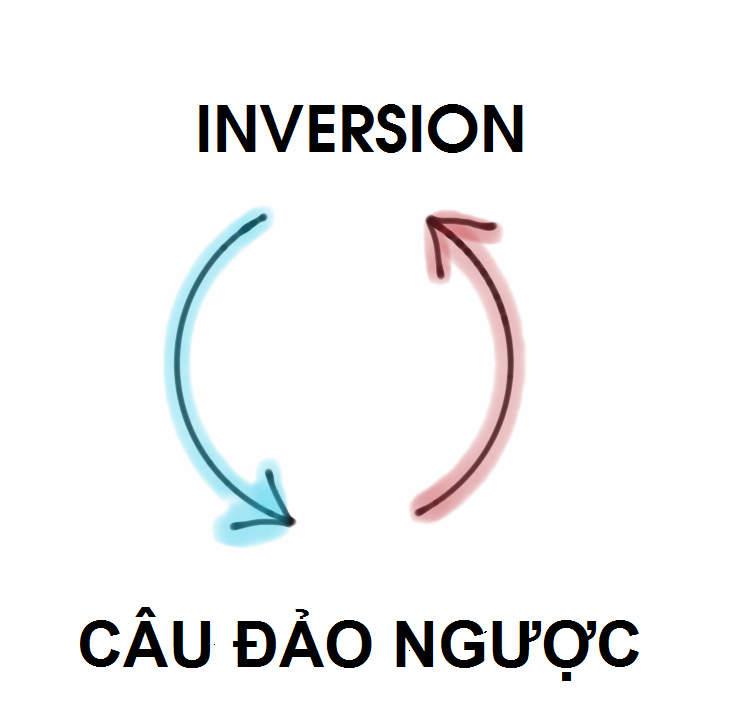Inversion
With inversion sentences you can emphasize an event or subject mentioned in the sentence. There are many inverted sentence structures that this lesson has listed. Let's explore with EnglishTopVN the article Inverted Sentences in English.
1. What is an anagram?
Emphasis can be placed on an event or subject in a sentence using the inversion sentence structure. This is the phenomenon of inversion, which is the phenomenon of reversing the position of the verb or auxiliary verb before the subject for the purpose of emphasis.
And there are also many different types of anagrams, which you may or may not have known. In this article, we will learn the most common types of inversions, to know how to apply them in tests and in real life.
2. Structure and usage of inverted sentences

Anagrams in English
2.1 Inversion with ONLY
Only once, Only later, Only in this way, Only in that way, Only then + Auxiliary + S + V, Only after + N, Only by V_ing/ N, Only when + clause, Only with + N, Only if + clause, Only in adv of time/place,…
For example:
-
Only once did I meet her.
-
Only after all guests had gone home could we relax.
-
Only when I understand her did I like her.
-
Only by practising English every day can you speak it fluently.
2.2 Inversions with FREQUENCY ADVERBS (usually negative adverbs)
Never/ Rarely/ Seldom /Little/ Hardly ever + auxiliary verb + S + V (never/rarely does someone do something.)
For example:
- Peter rarely studies hard. => Rarely does Peter study hard.
2.3 Inversion with CONDITIONAL SENTENCE
– Conditional sentence type 1: Should + S + V, S + will/should/may/shall + V…(If… then…)
For example:
- If the weather is nice tomorrow, we will go camping. => Should the weather be nice tomorrow, we will go camping.
– Conditional sentence type 2: Were S + to V/ Were S, S + would/could/might + V (If …. then …)
For example:
-
If I had money, I would buy that car. => Were I to have money, I would buy that car.
- If I were you, I would work harder. => Were I you, I would work harder.
– Conditional sentence type 3: Had + S + PII, S + would/should/might have PII (If… then…)
For example:
- If she hadn't eaten this cake, she wouldn't have had stomachache. => Had she not eaten this cake, she wouldn't have had stomachache.
– Attention:
-
Inversion of a conditional sentence is only inverted in the if clause, the following clause remains the same.
-
Inversion describes two actions that happen close together and consecutively after a while: No sooner… than, Scarely… when, Hardly… when,… then we use the formula:…. + had + S + PII …+ S + Ved (immediately after …..)

Anagrams in English
2.4 Anagram with UNTIL
– It was not … until that …: until => Not until + auxiliary verb + S + V + that + …
For example:
- It was not I became a mother that I knew how my mother loved me. => Not until did I become a mother that I knew how my mother loved me.
2.5 Inversion with phrases containing NO
– At no time, On no condition, On no account + Auxiliary + S + N, Under/ in no circumstances, For no reason, In no way, No longer
For example:
- On no account should U be late for the Exam.
2.6 Anagram with SO
So + Adj/ Adv + Auxiliary + S + V + that clause (noun clause)
For example:
-
So dark is it that I can’t write.
- So busy am I that I don’t have time to look after myself.
2.7 Anagram with NOT ONLY……. BUT……ALSO…
Not only + Auxiliary + S + V but…. also……….
For example:
-
Not only is he good at English but he also draws very well.
- Not only does he sing well but he also plays musical instruments perfectly.
2.8 Inverted sentences with negative adverbs: NEVER, RARELY, SELDOM, LITTLE, HARDLY EVER,…
Never/ Rarely/ Seldom /Little/ Hardly ever + Auxiliary + S + V
For example:
-
Never in Mid-summer does it snow.
-
Hardly ever does he speak in the public.

